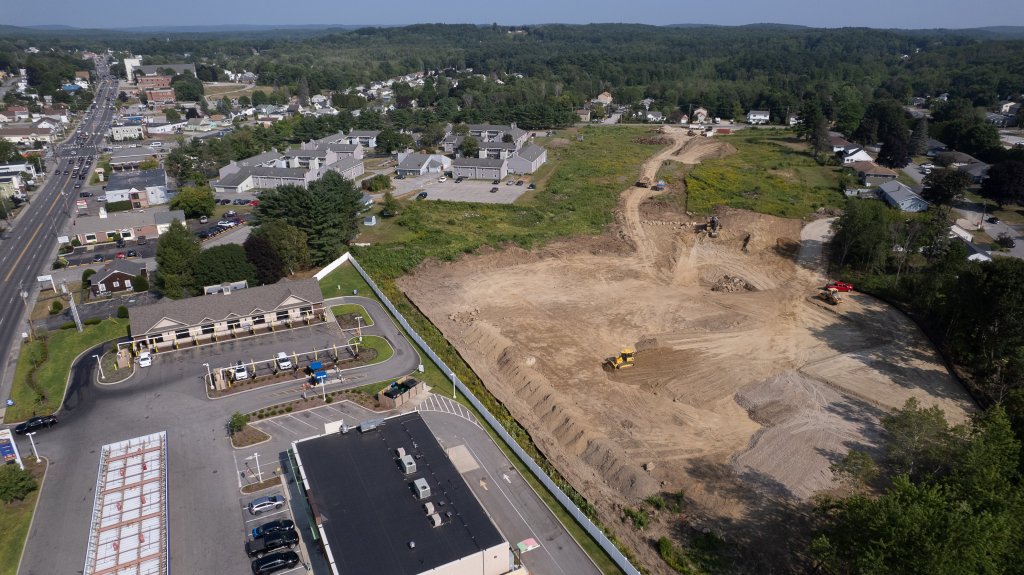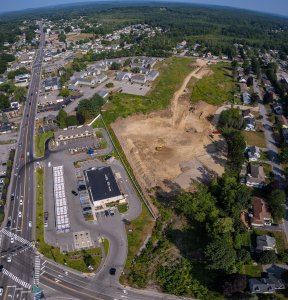
City officials will decide Tuesday on several financing agreements aimed at getting two senior housing projects across the finish line.

First, the city will consider a tax increment financing district and credit enhancement agreement for each of the first two phases of the 88-unit Martel School Apartments project.
Then the council will review a similar proposal for the Gendron Active Living Estates development off Farwell Street, which plans 208 apartments catering to those 55 years old and older.
The credit enhancement agreements would reimburse the developers between 65% and 75% of new property taxes generated by the developments for a set number of years. According to city staff, both projects have so far been unsuccessful in securing complete financing for construction to begin, and the agreements are meant to help address the financing gaps.
The two projects represent all of the city’s new senior housing projects either under construction or planned for development over the next several years. The projects comprise 296 of the 1,325 total housing units in the works in Lewiston.
MARTEL SCHOOL APARTMENTS
The senior housing project planned for the former Martel School has been years in the making.
Having been previously approved by the Lewiston Planning Board in late 2023, the project received $5.4 million in state funding in May of last year. The three-story brick building at 860 Lisbon St., which closed in 2019, was demolished last year after some delay stemming from asbestos remediation.
The proposed development includes construction of two buildings totaling 88 affordable one-bedroom units for low-income seniors, with a third phase of 44 units planned for the future.
According to Nate Libby, director of economic and community development, the project developer, Lewiston Housing, has secured most of the financing necessary to launch the project, but “gaps remain in both phases.”

Libby said Lewiston Housing requested the TIF to “assist in closing the gap.” The deal would return to Lewiston Housing 75% of new property taxes for a period of 16 years for Phase 1, and 17 years for Phase 2. Each phase will build 44 units, with an estimated post-development value of $4.87 million.
A council memo states the total new tax revenue collected over 20 years is $1.8 million, with the developer retaining $1.3 million and the city receiving $548,000.
In March, Lewiston Housing Executive Director Chris Kilmurry said the organization was eyeing a summer groundbreaking, and pushed back on criticism that the project has had unusual delays.
“We are funded, and this is going to happen,” he said at the time. “(Maine Housing) and (Lewiston Housing) are very committed to the project, and we continue to work through the normal processes to bring us to a construction closing.”
Lewiston Housing has over 1,090 households on its waiting list for public housing, with 737 (65%) seeking one-bedroom units, and 298 applications from seniors ages 55 and older. The bulk of the Martel units will be reserved for senior residents earning 50% or less of the area’s median income.
GENDRON ACTIVE LIVING ESTATES
The financing agreement for Dave Gendron’s 208-unit project is essentially an extension of a previous deal between the developer and the city, which was made last summer.
According to a council memo, the agreement required Gendron to secure financing for the development by the spring of this year.
“Due to a volatile worldwide market for building supplies and high costs of financing, the developer notified the city that they would not be able to secure financing according to the previous (agreement),” the memo states. “The developer has asked for an additional 18 months to secure financing, for which this revised agreement provides.”
The project, on an 11-acre parcel between Farwell Street and East Avenue, is planned to cater to those 55 and older, but Gendron will have the ability to change that should the market not support it.
City staff said the credit enhancement agreement is designed to offset “extraordinary development costs,” providing a 75% reimbursement of new property taxes generated by the development for the first five years, followed by 65% reimbursement for 15 years. The three phases of development are planned to come online in two-year intervals.
When the previous agreement was made, two councilors voted against it, highlighting criticism of the development proposal from neighbors who have argued that the number of units planned is too high for an area already plagued by traffic issues.
Lewiston officials have been largely in favor of using credit enhancement agreements to support economic development, particularly to assist market-rate housing projects that have high costs but can’t get the same rent prices as cities like Portland.
Asked about the credit enhancement agreements Monday, Mayor Carl Sheline said the sustained high cost of construction has forced the city “to dig a little deeper in an effort to get projects across the finish line.”
“These are hard choices to make, but we definitely need housing and economic development,” he said.
The Gendron project is estimated to generate $18.7 million in new taxes over a 28-year period. Under the TIF, Gendron retaining $10.5 million and the city receiving $8.2 million. At the expiration of the TIF, the city would collect $781,982 annually from the development.

We invite you to add your comments. We encourage a thoughtful exchange of ideas and information on this website. By joining the conversation, you are agreeing to our commenting policy and terms of use. More information is found on our FAQs. You can modify your screen name here.
Comments are managed by our staff during regular business hours Monday through Friday as well as limited hours on Saturday and Sunday. Comments held for moderation outside of those hours may take longer to approve.
Join the Conversation
Please sign into your Sun Journal account to participate in conversations below. If you do not have an account, you can register or subscribe. Questions? Please see our FAQs.